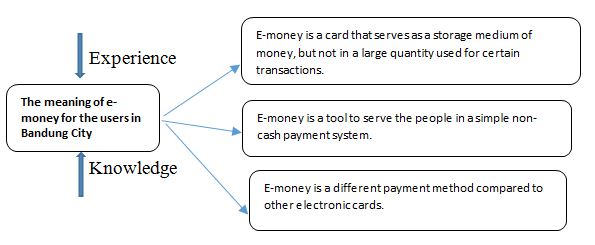The Usage of E-Money A Phenomenological Study of E-Money Usage by Users in Bandung City
DOI:
https://doi.org/10.18502/kss.v2i4.866Abstract
Usage of e-money for online purchases is becoming a trend among Indonesians, especially in Bandung, which points to changes in consumer behaviour. But does the usage of e-money enhance the security and efficiency of the online payment system? This paper takes a phenomenological approach to answer the question. Nine informants were selected by snowball sampling for observations and in-depth interviews. Triangulation was used to validate the data. The results indicated that based on the knowledge, feelings and experience of the users, the motives of the users in using e-money in their transactions were practicality, security and benefits such as discounts or bonuses. E-money left users feeling happy, satisfied and sophisticated since it simplified the transaction processes, but the user sometimes felt annoyed when they encountered technical and network problems.
References
Abu Ahmadi, Social Psychology., Jakarta, PT Rineka Cipta, 1999.
E. Ardianto, (2011). Research Methodology for Public Relations. Bandung: Simbiosa Rekatama Media.
Azwar Saifuddin, Human Attitude (Theory and Measurement), Pustaka Pelajar, Jakarta, 2013.
Amsal Bakhtiar, Rajagrafindo Persada, Philosiphical Sciences, 2009.
Bungin Burhan, Qualitative Research., Jakarta, Kencana Prenada Media Group, 2009.
J. W. Creswell, (2013). Qualitative Research and Research Design. Yogyakarta: Pustaka Pelajar.
B. Q.-A. Elvinaro Ardianto, The Philosophical of Communication Science., Bandung, PT Remaja Rosdakarya, 2007.
Eriyanto, (2008). Framing Analysis (Construction, Ideology and Political Media). Yogyakarta: LKiS Yogyakarta.
B. A. Fisher, Communication Theories., Bandung, CV Remadja Karya, 1978.
W. Gerungan, Social Psychology., Bandung, PT Refika Aditama, 2002.
M. Hasibuan, Motivation and Organization, Bumi Aksara, Jakarta, 1996.
E. Kuswarno, Communications Research Methodology Phenomenology Conception, Guidelines and Research Examples., Bandung, PT Widya Padjadjaran, 2009.
L. J. Moleong, Qualitative Research Methodology., Bandung, PT Remaja Rosdakarya, 2007.
Morissan., Communication Theories, Ghalia Indonesia, Jakarta, 2013.
D. Mulyana, PT Remaja Rosdakarya Offset, Metodologi Peneliian Kualitatif. PT Remaja Rosdakarya Offse, Bandung, 2006.
D. Mulyana, PT Remaja Rosdakarya Offset, Qualitative Research Methodology. PT Remaja Rosdakarya Offse, Bandung, 2006.
Prijana., (2005). Sampling Methods for Applied Social Research. Bandung: Humaniora.
J. Rakhmat, (2005). Psychology of Communication. Bandung: Remaja Rosdakarya.
A. Sobur, Filsafat Ilmu Komunikasi, PT Remaja Rosdakarya, Bandung, 2013.
A. Sobur, Semiotical Communication., Bandung, PT Remaja Rosdakarya Offset, 2006.
A. Sujanto, (1995). General Psychology. Jakarta: Bumi Aksara.
B. Walgito, Pengantar Psikologi Umum, CV Andi Offset, Yogyakarta, 2010.
Indonesia Punya Masa Depan Cerah, Retrieved from https://id.techinasia.com/emoney-di-indonesia-punya-masa-depan-cerah/.

